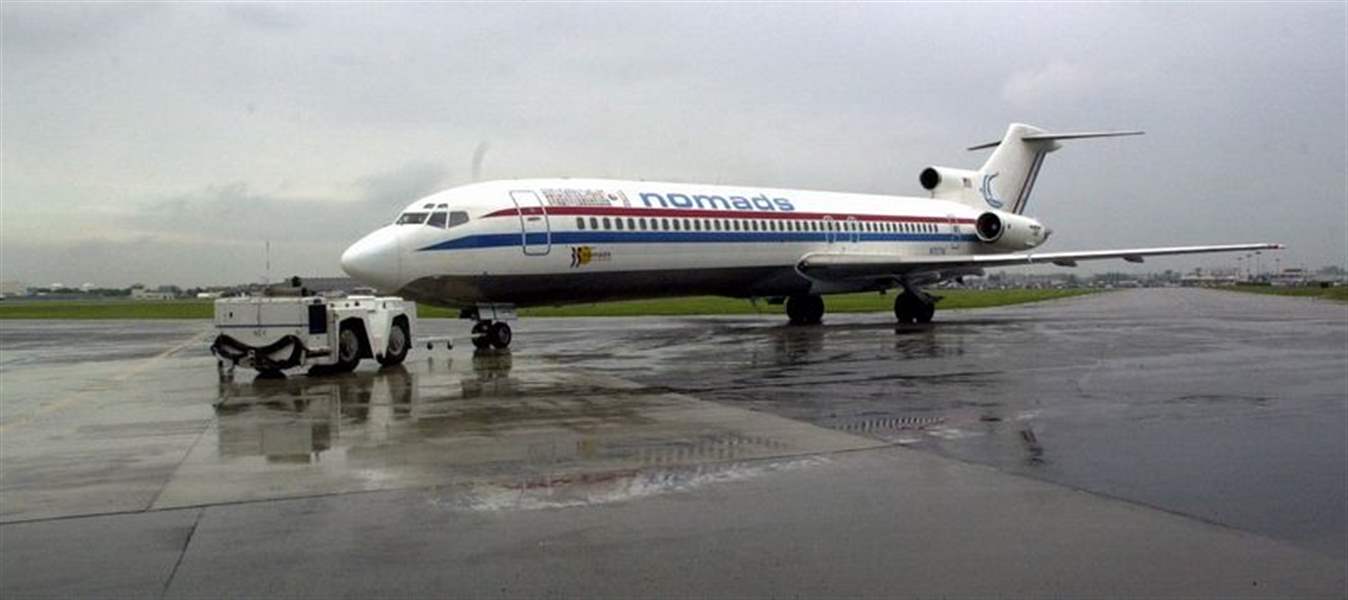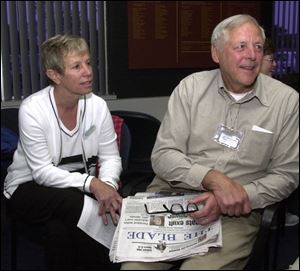
World wanderers: Nomads travel club takes 'grunt work' out of trips
10/7/2001
The Nomads' "flying clubhouse" transports members around the country and the world in comfort. he 727 was customized to provide business-class seating for 145 passengers.
blade

Kay and James Delphi, of Perrysburg, relax in the Nomads terminal before leaving on a trip with the travel club.
DETROIT - Outside the compact blue terminal at Metro Airport, a short line of cars made its way slowly past a drop-off point, each vehicle pausing just long enough for its trunk to be popped open and a bag or two grabbed by an attendant and placed on a luggage cart.
Inside the terminal, several dozen people in a lounge area sipped coffee, read newspapers, and chatted while they waited to board their flight. (View more Nomad traveling club photos)
A typical airport scene, but with one difference: The passengers here had no idea where they were headed.
“Heaven knows where we're going to land,” said Jean Long, of Detroit. “Hopefully someplace warm.”
“I've tried to figure it out before, but I'm almost never right,” shrugged Gil Lambert of Brighton, Mich.
“Somebody said it was ‘a capital city.'” said James Delph, of Perrysburg. He paused a beat, then added with a chuckle, “Maybe it's Columbus.”
These folks are members of one of America's biggest private travel clubs - the Nomads - and they were all here to embark on one of the club's popular “mystery trips,” with a destination known only to club officials, the trip director, and the flight crew.
“We don't know where we're going and we don't much care,” said Michael Yoshonis of Troy, Mich. “That's half the fun.”
Another part of the fun for Nomads members is avoiding many of the typical headaches faced by air travelers. Trip directors handle hotel, tour, and show reservations, as well as the myriad other details that go into arranging a vacation. There are no connecting flights to catch and no hurrying through airport terminals. If members choose to go with the whole trip package, all they have to do is show up and get on the plane.
“We had been traveling independently, but some friends got us interested in the club,” said Blair Algie of Farmington Hills, Mich. “Now we've got none of the hassle, none of the ‘grunt work' of traveling. They take care of everything, which makes travel much more pleasurable.”
“You get spoiled after one trip,” added Mr. Yoshonis, a member for 11 years.
Winter trips provide a special treat for Nomads members, according to Cristina Peixoto, the club's director of marketing and customer service. “In cold weather, [passengers] can hang their heavy coats up and leave their boots in a room at the terminal while they fly off to someplace warm,” she said. “Then they just pick them up when they get back.”
When they walk out to the Nomads parking lot, they also find that the snow has been brushed off their vehicles.
Nomads has been in operation since 1965, when it was one of dozens of travel clubs formed in that era in response to the high price of commercial air travel. Many of those clubs even bought airplanes. Over the years, though, airline deregulation led to cheaper commercial fares and the clubs' fuel costs increased, prompting most of them to disband.
Nomads survived, and today it has more than 12,000 members, making it one of the largest nonprofit travel clubs in the country. It's also the only one that still has its own plane, a 146-seat Boeing 727, which it keeps in a hangar attached to its terminal.

The Nomads' "flying clubhouse" transports members around the country and the world in comfort. he 727 was customized to provide business-class seating for 145 passengers.
The club's first plane was a small prop job, but over the years it has graduated to a succession of larger craft. The current one, referred to as the Nomads' “flying clubhouse,” was purchased from a bankrupt Pan American Airlines in 1993. The club reconfigured the plane, removing 33 of its 178 seats to give passengers business-class legroom on their flights.
Nomads sponsors about 75 trips a year, ranging from quick jaunts to the Mall of America near Minneapolis (less than $200) to 28-day world tours ($12,500). In between, the journeys include dozens of domestic and foreign destinations such as New Orleans, Alaska, Bermuda, Ireland, New Zealand, and China. A monthly magazine alerts members to upcoming trips so they can make reservations well in advance.
Among the club perks are little touches such as curbside luggage service, free parking in a fenced lot at the Nomads terminal, and free coffee, donuts, and newspapers in the lounge before flights. When a Nomads flight arrives somewhere, members avoid the crush at the terminal by being picked up by buses right at the plane.
Another plus for many members is the idea of traveling with people they know. A number of friendships have grown out of previous trips and the club's periodic social events held in the Detroit area. There is an easy camaraderie in the lounge as members arrive for their flights and spot familiar faces.
Robert Nowak of Toledo and his wife, Margaret, have been Nomads since 1976, and both cite the friendliness of club members as one of the big pluses of belonging. “You can be somewhere on the other side of the world,” Mr. Nowak said, “and you'll see somebody wearing their Nomads badge in a restaurant and wind up asking them to join you for dinner.”
Because the club buys hotel rooms and other trip components in bulk, it can often beat the price an individual traveler might pay to put his own trip together. Nevertheless, Nomads isn't for the budget traveler, as even its president will admit.
“Are we cheaper? Sometimes. It depends on the trip,” said club president Jim Heckman. “With Vegas, for example, it's hard to compete with the charters. But say, Martha's Vineyard - with us you'd get the trip, hotel, and everything else for what an individual would pay just for the air. They'd have to go to Boston or Portland, Maine, then transfer to a smaller plane.
“On the other hand, with a trip to New York City, I tell them it might be more expensive [with Nomads], and they say they don't care.” For international trips, Nomads members can often save money by flying directly to a destination rather than following the segmented routes of commercial carriers.
Still, many members say they're more interested in service and convenience than in saving a buck.
“Price is not a real factor,” said Mr. Algie. “Because of the efficiency of the operation, we figure it's competitive. And everything is sort of top cabin.”
“If we did the same trips on our own, I suspect we'd pay more,” said Kay Delph, of Perrysburg, who with her husband, James, has been with Nomads since 1983.
“Another thing to consider is the time factor,” added Mr. Delph. “With changing planes, waiting at airports, and all that, you can easily lose a day traveling with regular airlines. With the club you make the most of your time away.”
In addition to the costs of the individual trips, club membership itself carries a price: an individual initiation fee of $400, plus annual family dues of $132.
Not all Nomads trips are taken in the club's 727; sometimes trains or cruise ships are used, and Nomads charters planes for special trips. Several times in the '80s and '90s, for example, the group chartered supersonic Concordes for luxury trips to Europe, with passengers flying over and taking the Queen Elizabeth II back. The only time a Concorde has ever flown into Detroit has been for a Nomads charter.
Many of the club's trips appeal to an older, more affluent crowd, and that's reflected in a median member age of about 60. Mr. Heckman said the club would like to lower that age by offering more “adventure” trips such as whitewater rafting, which presumably would appeal to younger travelers.
“If we get somebody in the club in their 40s, they'll probably remain in it into their 80s,” the Nomads president said.
Because of its FAA charter, Nomads is not allowed to advertise its trips, but the club is constantly trying to boost its membership by sending representatives to speak at local organizations and holding orientation meetings and open houses. And despite the concerns of some current members, Mr. Heckman said it's unlikely that new members would result in stiffer competition for openings on future trips.
“Different kinds of trips appeal to different members,” Mr. Heckman said. “New people coming in aren't going to be taking the same trips as veteran members.” And the club still has plenty of room for growth, he added.
“We have the infrastructure to fly 600 to 650 hours a year,” he said. “This year we'll fly about 450 hours.”
Only about 2,000 to 2,500 of the group's 12,000 members are regular travelers, he said, with the rest taking trips very infrequently. Most of the club's members live within a few hours of Detroit, but some have moved to other parts of the country and return from time to time to take a Nomads trip.
Nomads has less than 20 full and part-time employees, plus a cadre of more than 200 volunteers who do everything from plan trips to load luggage. “They're the ones who really make the club run,” said Mr. Heckman.
The crew for each flight includes a captain, first officer, flight engineer, trip director, and three flight attendants. There is only one full-time pilot on the Nomads payroll; the rest of the pilots, as well as the flight attendants, are commercial airline employees who work club flights in exchange for free trips.
The club's jetliner could last for decades, Mr. Heckman said, because it's flown only a fraction of the hours that a commercial plane would be, resulting in much less wear and tear. “And we do maintenance more often than the airlines,” he added. “The FAA has told us the only plane kept in better shape than ours is Air Force One.”
Unlike commercial airliners, no alcohol is served on Nomads flights, but member Michael Yoshonis says that's not much of a hardship.
“We expect first-class service and first-class accommodations wherever we go, so we have to act the part, and one part of that is not getting off the plane sloshed,” he said. “Of course for some, one of the first targets at our destinations is the bar.”
Last month's airliner hijackings and terrorist attacks, which have severely reduced bookings on commercial airlines, have only increased public interest in the Nomads. The club has received several calls from potential members in recent weeks, according to Ms. Peixoto.
“People don't want to give up on travel, and they perceive Nomads as a safer way to do it,” Ms. Peixoto said. There's good reason for this, she added.
“Our plane is kept in a hangar that has restricted access, and no one can get near it,” she said. “We service it with our own people, and when our members fly, they know the crew members and many of the other passengers. There are no outsiders on the plane, only club members.”